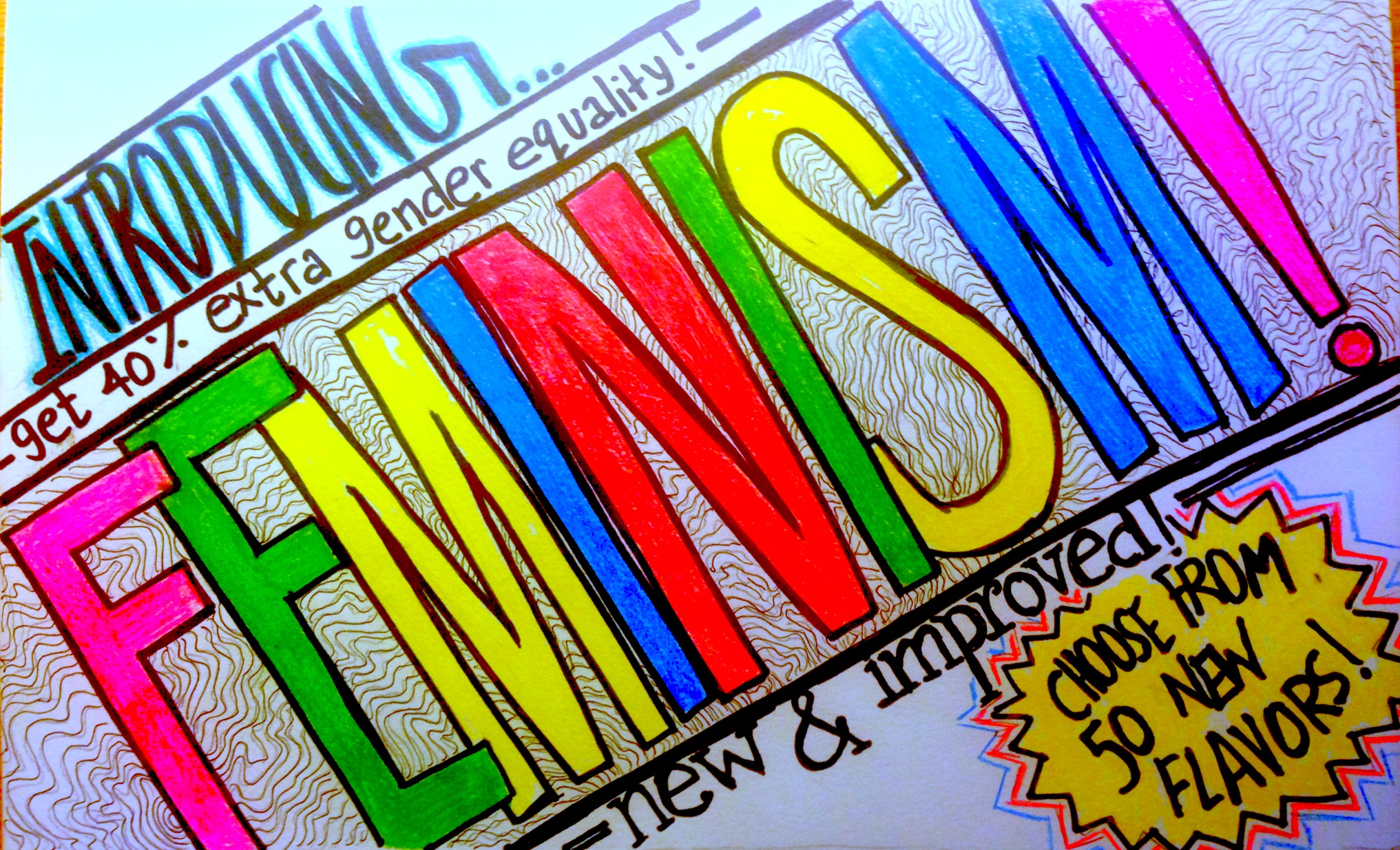Just Add Water: Feminism For Everyone!

In November 2013, fashion magazine Elle UK launched a campaign, as they put it, to rebrand feminism. In a nutshell: they got three major British feminist groups to collaborate with three advertising agencies to give feminism a “makeover”. And it worked. The piece was shared 83 million times across social media and sparked conversation and debate all over the world. Naturally, there were supportive reactions and reactions that condemned the action of “rebranding,” stating that “rebranding” implied that there was something fundamentally wrong with the premise of feminism.
This is what I’m attempting to explore right now. Do we need to “rebrand” feminism? Does having this conversation detract from the purpose of the movement? And if we did “rebrand,” how would we do it?
The Elle example demonstrates perfectly every aspect of this issue. A fashion magazine is something that is wide-reaching, not limited to literary or activist circles – it’s a channel through which we can access the masses easily. Their intention was honorable – as they wrote in a follow-up article, they wanted to “re-brand a term that many feel has become burdened with complications and negativity.” This is irrefutably true – there are few other movements which receive as much vitriolic attack as feminism. This is truly amazing to me, because feminism is a movement that aims towards gender equality, primarily through the upliftment of women. This has been tirelessly stated millions of times before me. Ideally, this should not be a message that needs to be sugarcoated to be understood. But Elle recognized a problem: for whatever reason, something happened down the line, and feminism is now left floundering in a sea of bad PR.
What really seals the deal for me is the debate held later that month in London where Elle editor Lorraine Candy, was present. She told the assembled crowd, according to this Telegraph report, “But, personally, I don’t think feminism does need rebranding. You’re either feminist or you’re not; you either believe that women are equal to men, or not.” And this just about sums up the struggle faced by the feminist movement – how do we reconcile our personal belief with what we need to do to connect with the masses?
Marketing is frustrating. Here’s what I hope will be an illustrative example. Today in the music industry, the most popular musicians aren’t the ones that are the most talented, they’re the ones with the best marketing executives working for them. As an artist, it’s very good to want to retain your individuality, but after a point, you need to think about how you’re being received. If people don’t like you, they don’t like you, and it doesn’t help to bitch about it and keep telling them that you’re actually really talented and you write lyrics that touch the soul of the universe and will change their lives. You’ll have your core group of fans who see you for who you are, but that’s it – and in an industry where your success is measured by the impact you have on people, that’s not very good. As a feminist, I feel like the quintessential misunderstood artist playing small gigs in bars for the rest of their life.
I wish I had a major in sociology and economics so I could understand how advertising affects people in large groups, but I cannot. But I do know that for the longest time, feminism has been seen as something either academic or activist, and being someone who is both, I am comfortable in it. But not everyone is like me – in fact, the majority of people are neither of the two. How can we expect them to think critically and accept a movement that they feel has rarely represented them?
Feminism is a challenging movement, it questions the status quo and the nature of our identities, which is hard enough to do as it is. Without representative role models, I’m hardly surprised that it hasn’t caught on. We talk about the plurality of women, how we need to do away with stereotypes, how we need to stop trapping people in comfortable roles – and so, in accordance with that, we need to make feminism more ordinary, more widespread, more inclusive. A movement must parallel the people it hopes to represent.
So how do we work towards this? One thing people are talking about is renaming feminism to equalism or gender egalitarianism in the hopes of making it more likeable, to which the responses have been adequately scathing. Admittedly, this is something that I have thought about and struggled with, but Chuck Wending summed it up when he wrote:
“It’s like being in a room with a locked door. Someone needs to pick the lock to escape, so it’s worthless to say, ‘Well, I think all doors should be open.’ Yeah, that’s super-fucking great as a theory, but seriously, we need to deal with the door standing in our way first … it sounds galling to be the ones who have the lion’s share and say, “I think all people should share in the spoils, not just women.” In other words, you’ve included yourself in that generic, unfocused “everybody” group. And this is where equalism / humanism / egalitarianism feels wifty, wonky, lazy, weak — it’s a pie’s eye view, a gesture with a limp noodle fingers, “Sure, sure, yes, we should all be equal, and we should all have ponies, and let them eat cake. The ponies and the people. Let the ponies and the people eat cake, in case I wasn’t clear.”
By losing the name “feminism,” we run the risk of losing the movement altogether, of having it melt into complacent nothingness. “Human beings should have all the rights” has been said before. It’s in the fucking Geneva Convention, it’s the law, everyone knows it. Feminism exists because this wasn’t adequate, because apparently being a human comes with terms and conditions.
Every action comes with an equal and opposite reaction – this is a part of bringing change that cannot be ignored or evaded. Daniel Dalton wrote in this great Buzzfeed article:
“Many more people are identifying as feminist than were a year ago. The perceived PR problem fixes itself the more open dialogue we engage in, the more diverse voices are given platforms, the more people start to identify as feminist.
There is no perfect solution for gender inequality. Feminism is an umbrella under which many voices and ideals are gathered, and a far more pressing concern is to make sure those voices are included and heard, across boundaries of race, class, and gender.
In a perfect world we wouldn’t need feminism. We can all agree that’s not the world we live in. This imperfect solution is the best we’ve got. It is what we make it. Thanks to the tireless work of generations, feminism is more open and inclusive than ever.”
It’s hard to face the uphill struggle that we are presented with, and acknowledging this progress always helps. No movement comprised of human beings will ever be perfect. We evolve and grow every day, and that is all we can hope for. Dialogue on this issue, spurred on by people like those behind Elle UK’s campaign, is only beneficial. My personal opinion is that we have already started to make feminism more accessible, more “common.” It’s become somewhat of a trend in celebrity circles, Emma Watson extended an invitation to men in her HeForShe speech at the UN – of course, like any change, it is gradual and can always be done in better ways. Some days I am disheartened when people I care about say, “I would whole-heartedly support the movement if it was just called something else.” But an effective revolution is one in which no one forces anything on anyone. I do not have all the answers – if I did, I wouldn’t be writing this. If we’re going to look at feminism as a product to be marketed, how far do we take it? Is there a point where it will cease to be feminism and begin to be a weak idea designed to comfort everyone?
And, most importantly, if we’re selling feminism, how much does it cost?




